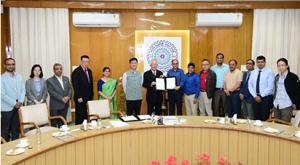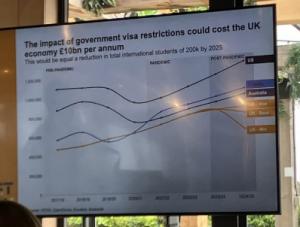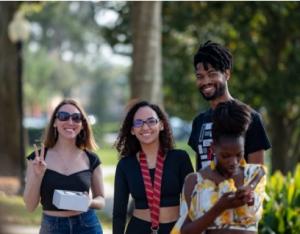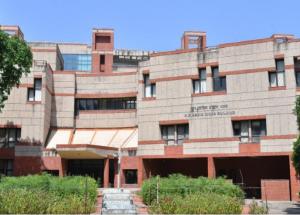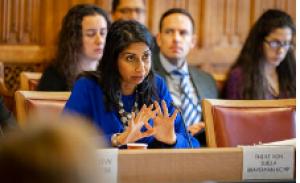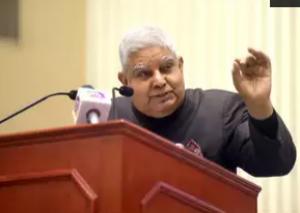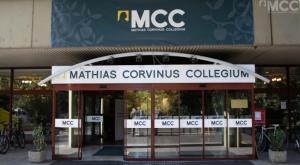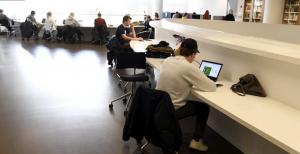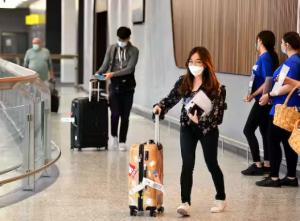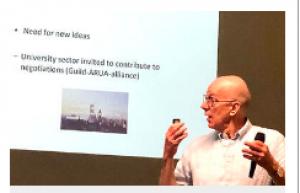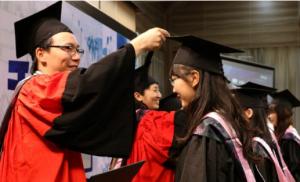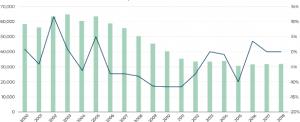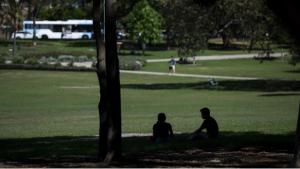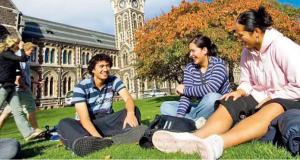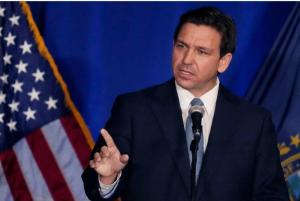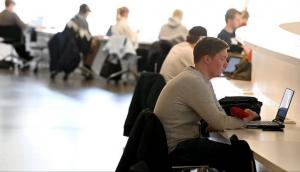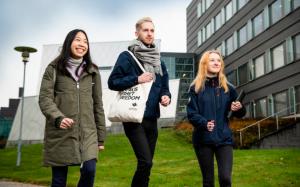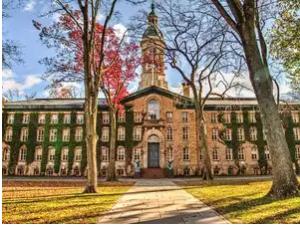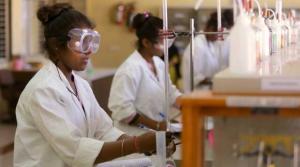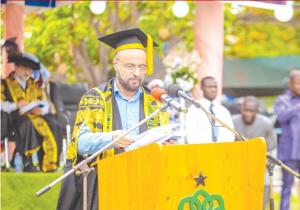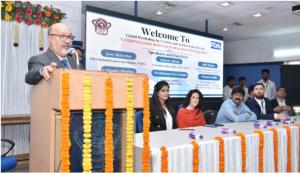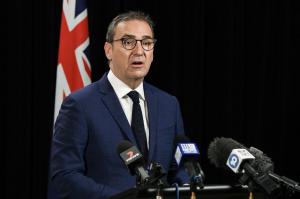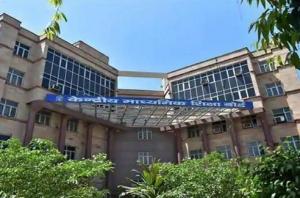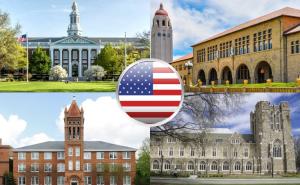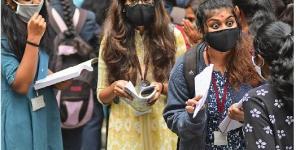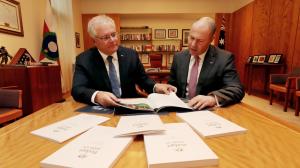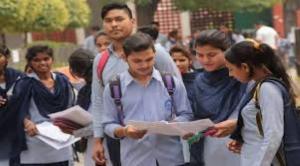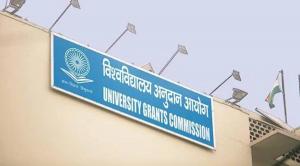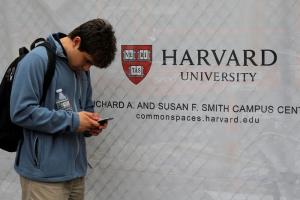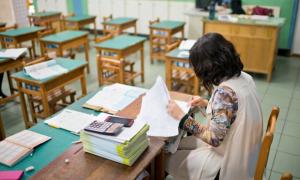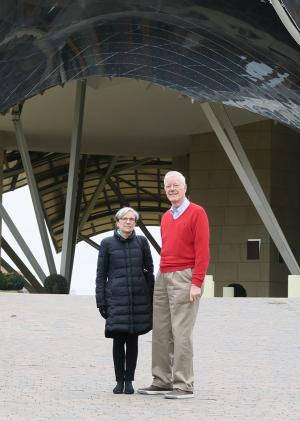Higher education stakeholders desperate to prevent the Conservative government from clamping down on international students and their dependants have been bolstered by new data claiming the economic benefit of foreign students to the United Kingdom soared from £31.3 billion (US$39 billion) to £41.9 billion between 2018-19 and 2021-22.
The move comes as speculation mounts that net migration figures to the United Kingdom due out next week will rise from half a million to over 700,000.
The last few years have seen massive growth in international students, spurred by the British government’s own international education strategy, which aimed to grow foreign student numbers from 485,000 in 2018-19 to 600,000 by 2030 and boost the value of education exports to £35 billion.
That recruitment target was easily reached as figures for foreign students burst through the 600,000 mark eight years ahead of schedule, surging after the British government eased student visas and introduced a two-year post-study work graduate route.
However, what was initially a cause for celebration in both government circles and the higher education sector has now turned toxic and triggered a briefing war between Education Secretary Gillian Keegan and supporters of growing international student numbers in the UK, and the controversial right-wing Home Secretary Suella Braverman and her backers who want to cut immigration to the UK, as University World News reported back in February.
Taking back control of immigration was a key message of the 2016 Brexit referendum campaign and 700,000 would represent a massive increase on the 271,000 at the time of the last election in 2019 when the Conservatives pledged to cut the overall number.
More by good fortune than planning, a timely new report was launched on Tuesday 16 May titled The Benefits and Costs of International Higher Education Students to the UK Economy, which provides plenty of ‘ammunition’ about the value of international students and their crucial role in levelling up the economy in every part of England, Wales, Scotland and Northern Ireland.
Value to each UK resident
It is the third iteration of research by London Economics for the Higher Education Policy Institute, Universities UK International and Kaplan International Pathways.
For the first time, it breaks down an estimated value of foreign students to each of 650 parliamentary constituencies in the UK.
This shows that the typical net economic contribution to the UK economy per parliamentary constituency is about £58 million, or £560 per member of the resident population, with the highest value per member of the resident population in Glasgow Central in Scotland, where the economic value of international students is said to be worth £292 million to the constituency, or £2,720 per resident, followed by the parliamentary seat held by Labour leader Sir Keir Starmer in Holborn and St Pancras, London (£291 million for the constituency and £1,720 per resident).
An event held to unveil the findings on 16 May was told by Nick Hillman, director of the Higher Education Policy Institute and a former special advisor to David Willetts when he was Conservative minister of state for universities and science from 2010 until July 2014, that the economic value of hosting international students will be sent to every candidate standing in the next UK general election, expected in 2024.
“If people want to oppose the presence of international students, fine, but they should only do that if they know the benefits they bring and do so with their eyes wide open,” he told those attending the launch.
A textbook example of levelling up
Speaking at the event, Professor Wendy Alexander, vice-principal (international) of the University of Dundee and the Scottish government’s higher education trade and investment envoy, said: “Most sectors would die for a 60% growth in net economic value.”
She described the boost in international students coming to the UK as a “textbook example of levelling-up success”, joking that there were not many league tables where Glasgow Central came top.
She was one of several speakers highlighting that the character of international students has changed dramatically since the international education strategy was launched, with higher education institutions doing what the government requested and focusing student recruitment on countries such as India and Nigeria to avoid over-reliance on students from China.
“Those new students coming from Asia and Africa tend to be older and looking for postgraduate study and they are more interested in employability and affordability and often have dependants, either in their own country or with them when they come to study here,” said Alexander.
She admitted it can put extra pressure on accommodation if dependants arrive with international students, but claimed the Home Office was “denying local authorities and universities data on dependants”, which she described as “the very antithesis of joined up government, because the starting point for solutions and solving new student challenges is sharing data and introducing a proper planning function”.
Home Office statement
A spokeswoman for the Home Office told University World News it does publish figures for dependants, but the website links she sent to us did not work and the one directed to an Excel sheet indicated that the next immigration system’s statistics would be updated on 25 May 2023 and had no information about the previous quarter.
She also emailed a statement saying: “The public rightly expect us to control our borders and we remain committed to reducing overall net migration, while ensuring we have the skills our economy and public services need.
“We keep all our immigration policies under constant review to continue to strike a balance between welcoming people who contribute to the UK’s academic institutions and reducing overall net migration over time.
“Our points-based system is designed to be flexible according to the UK’s needs – including attracting top-class talent from across the world to contribute to the UK’s excellent academic reputation and to help keep our universities competitive on the world stage.
“We will always consider all options to ensure that the immigration system is delivering for the British people – including looking at the issue of student dependants.
“Higher education providers make their own decisions about where to focus their recruitment of international students.”
Proposed clampdown
The Times newspaper reported on 17 May it had seen a copy of five proposals drawn up by the Home Secretary which included making it harder to bring spouses to Britain, reducing the time that foreign students can stay after their courses end, banning students from bringing family members and removing students who drop out of courses.
The newspaper said so far only one limited proposal, which would ban foreign masters students from bringing relatives with them, has received the backing of other cabinet ministers and suggested that Braverman was growing increasingly frustrated by the lack of support for further clampdowns.
Hillman said: “We need to remember that when politicians beat up on the sector for international students bringing dependants with them, that it is partly a response to policymakers’ own edicts to be less reliant on China.
“It’s not universities that have been encouraging dependants to come, but they have been attracting students from a wider mix of countries and it’s wonderful that Indian numbers have gone up so much because demand was being held artificially down.”
International students are also human
What international students make of all of this was left to Sára Kozáková, a masters student from Slovakia at Newcastle University, who is also a student representative on the International Higher Education Commission, set up by former Conservative government universities minister Chris Skidmore MP to help shape a new international education strategy.
“It feels really weird to read about how much I am worth to the UK in money terms,” she said and added that she was shocked to discover that one in four international students used to be European and now (after the Brexit withdrawal agreement) it is one in 12.
“I am a European student who has pre-settled status, which data-wise means I am a home student and can pay home tuition fees, but my needs are very different to home students. I am still international. I just feel forgotten about.”
She told University World News: “The UK government seems to want to ‘cherry-pick’ the international students it wants and keeps speculating about changing post-study work visas and the like, which is not a good look when you are an international student looking at potential choices for studying abroad.”
She said she hopes to do her final dissertation on “What does the UK really think of international students?” and urged higher education stakeholders not to treat international students as a mass.
“We are real human beings with different histories and skillsets, so think beyond the money and don’t just treat us as a number on a spreadsheet.”

Source link: https://www.universityworldnews.com/post.php?story=20230518105254107
















